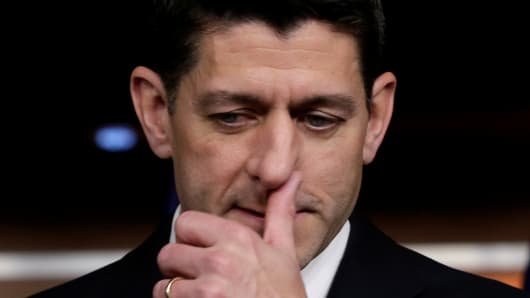So how is this going to cost you? Because whether the replacement bill passes or not, the insurance companies, hospitals, and even Big Pharma have surely been watching the Republicans fold on Capitol Hill. And now that they know that even the supposedly most ardent Obamacare opponents aren't willing to back off the costliest aspect of this new entitlement, they have them and all of America right where they want them. Remember, the only reason why this bill is back up for a vote now is because several Republicans led by Rep. Fred Upton were finally coaxed into supporting it because of an additional $8 billion in promises to help cover people with pre-existing conditions. So what's the health care and health insurance industry's incentive to keep premiums, fees for service, and vital drug prices for these patients down? Not much. In essence, this is very much like a used car salesman knowing that you will not leave his lot empty handed.
But let's call a time out here and get a handle on the actual number of Americans with pre-existing conditions who could not get insurance coverage prior to Obamacare. Remember that Medicare, Medicaid, and employer-based insurance plans were always barred from rejecting people with existing conditions from their plans. We're only talking about people who do not work for companies that provide health insurance who are not poor enough for Medicaid and not old enough for Medicare. Obamacare set up a special program called the Pre-Existing Insurance Program as a bridge until Obamacare's insurance regulations took effect in 2014. But during that period, only 114,000 people signed up for that program. So much for fixing a problem supposedly affecting millions of Americans. Many health experts have noted that the cost of covering these people wouldn't be cheap, but it would be a drop in the bucket compared to the ACA's overall costs.
Essentially, fears for these 114,000 or so Americans and their ability to wreak havoc politically has held the Republicans and our entire health-care system hostage. Instead of working to compassionately to help this group, politicians from both parties have scrambled to hurt everyone else just to protect their own hides from the potential bad publicity.
So when it comes to the annual game of insurance companies submitting their proposed increases to Obamacare premiums and deductibles, the insurance companies have new leverage against a Congress and a White House that has telegraphed their biggest fears to everyone at the bargaining table. Same goes for the drug companies and hospitals who can now continue to charge those insurance companies just about whatever they want for their goods and services. The insurers will simply kick those costs back to the politicians, who will happily spend more of the taxpayers' money to cover the bill.
Lost in all of this is any alternative voice or idea. Republicans and Democrats are basically promoting the same message and the same priorities. Where in this bill is there anything that will truly increase the number of insurance companies who will compete for our business? Nowhere. Where is there anything in this bill that will reduce the massive barriers to entry into the health-care field for potential doctors or new hospitals? Nowhere. And on and on it goes.
In fact, there's very little in this bill that makes more sense economically than the already economically-failing Obamacare. But in the battle of sound economics vs. dramatic and damaging political theater, sound economics has been losing since the days of ancient Greece. The problem is that the political class' priority is to protect itself, and it has decided that upending the entire nation's health-insurance system to provide coverage for about 114,000 people is the best way to do that for themselves. And so now we know that for real health-care cost relief that doesn't include rationing, we're going to have to look beyond government completely.
Commentary by Jake Novak, CNBC.com senior columnist. Follow him on Twitter @jakejakeny.
For more insight from CNBC contributors, follow @CNBCopinion on Twitter.



